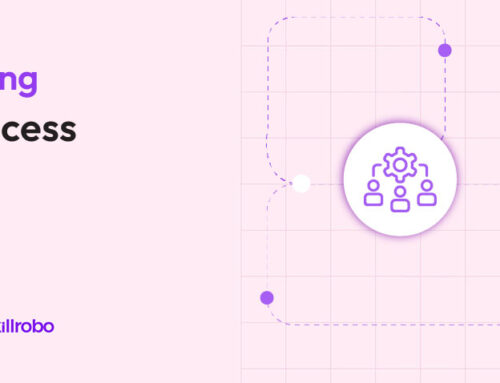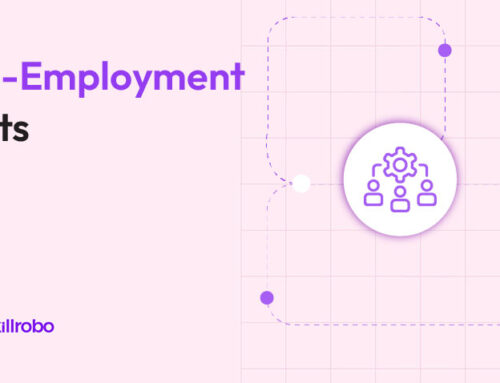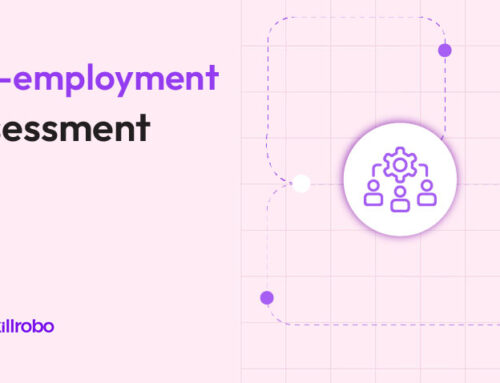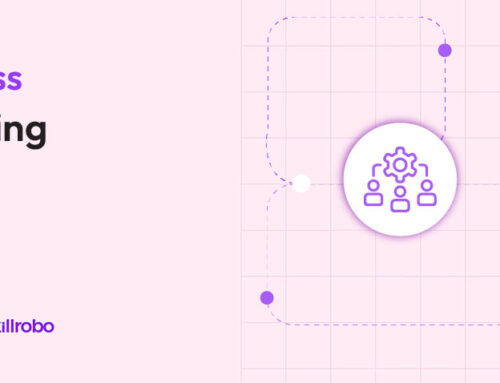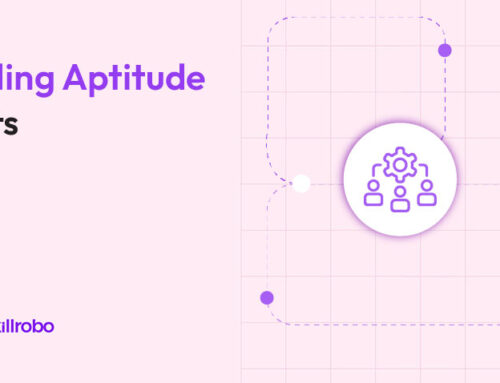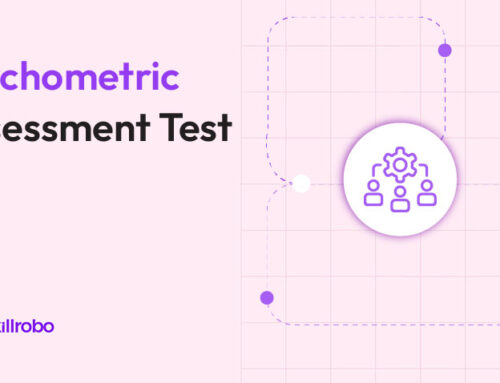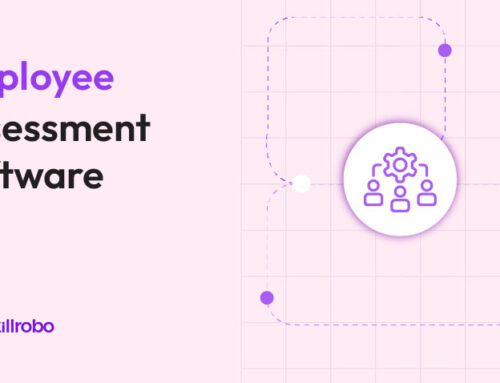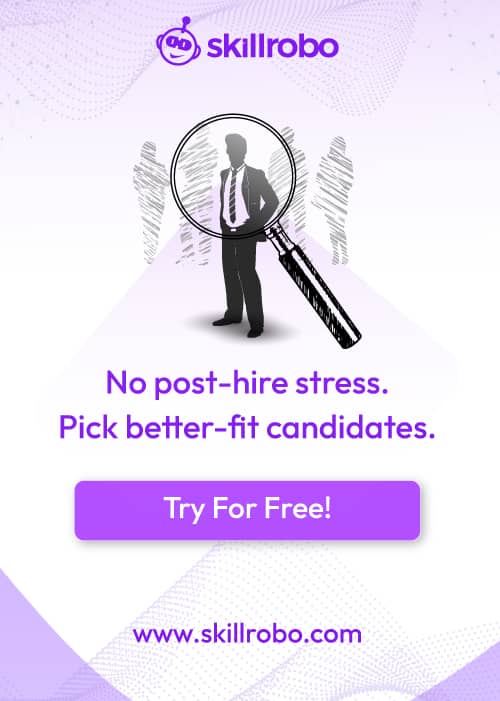Table of Contents
- What is Pre-Employment Testing Software?
- What is a Pre-Employment Assessment?
- Need for Pre-Employment Assessment Tools
- How do Pre-employment Assessments Work?
- Must-have Features of Pre-Employment Screening Software
- How to Choose the Best Pre-Employment Assessment Test?
- Pros and Cons of Using Pre-Employment Skill Assessments
- Best Practices in Pre-Employment Skill Assessments
- Conclusion
Related articles
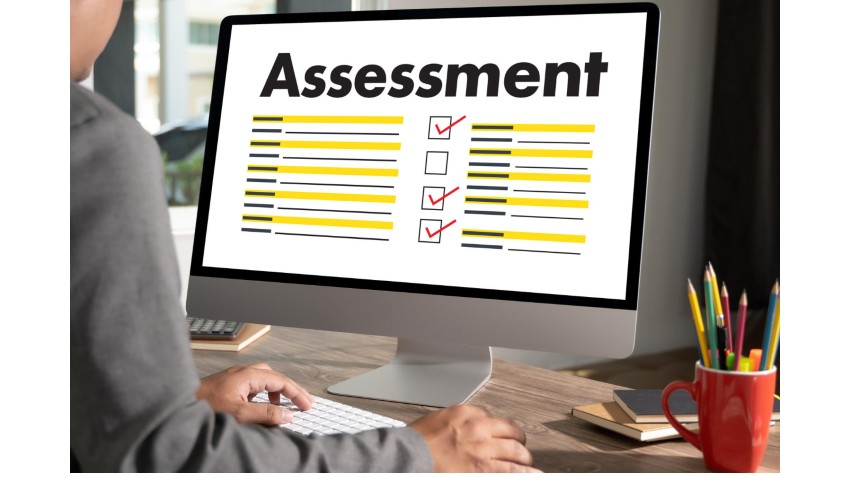
Picture this – A growing business has plans of expanding its project teams with skilled and competent employees. New hires need to be onboarded quickly so that project expansions are successfully handled.
How do you hire skilled and competent candidates for various job roles within a short duration of time?
Hiring at scale for multiple job positions can be intimidating especially when you are using archaic, manual hiring methods. Manual hiring methods lack the accuracy and speed that is required for mass hiring or hiring for niche skills.
Pre-employment testing software to the rescue! Hiring teams worldwide are adopting pre-employment screening software as part of their recruitment process for better hiring outcomes. Pre-employment skill assessments are convenient to administer via email links and can be shared with several candidates simultaneously.
What is Pre-Employment Testing Software?
Pre-employment testing software is a tool that helps recruiters and hiring teams identify the right fit for open job positions quickly and effectively. Online pre-employment assessment tests comprise custom evaluations as per the skill requirements of the role. Pre-employment testing software is specifically designed to evaluate candidates based on their skills, knowledge, job readiness, and behavioral tendencies.
What is a Pre-Employment Assessment?
Pre-employment screening is very effective in shortlisting skilled and talented candidates from a vast candidate pool. The questions in the assessment can be customized according to the role for which the candidate is being hired. Hiring teams can add their own questions to the assessments in employee assessment tools so that candidates are evaluated on all important aspects.
For example:
The test for a finance executive’s role can be customized to include finance and accounting skill assessments, math and reasoning skill assessments, communication skill assessments, and behavioral tendency evaluations that focus on skills such as attention to detail, and organization skills. Online pre-employment testing links can be conveniently shared with prospective hires via email. They can take up the assessment from any convenient location and a convenient time by simply clicking on the link.
The skill assessment is usually conducted in a secure browser environment that enables remote proctoring. The online activity of the candidate during the test is monitored and a report is sent to the hiring team upon completion of the test. This way, fraud and cheating practices during the exam can be avoided. Online candidate assessment tools are often integrated with applicant tracking systems (ATS) for comprehensive hiring.
The main purpose of online pre-employment testing is to identify the perfect fit for open job positions in an organization. The use of pre-employment skill assessment software has several advantages comprehensive skill evaluation, reduced time-to-hire, and cost-to-hire. They save the hiring team from the effort of screening a large pool of candidates.
Unlike traditional hiring methods that are subjective, online assessment tools enable objective evaluation of candidates. The reports and analytics provided by the pre-employment assessment software enable informed hiring decisions.
Need for Pre-Employment Assessment Tools
Employers are looking to gather as much information about the candidate as possible during the hiring process. Their job-related skills and competencies, behavioral tendencies, personality traits, and other soft skills can be evaluated thoroughly via these assessments. Traditional candidate assessment methods do not often yield the best results. Moreover, the information furnished by the candidate through their resumes is not 100% accurate and reliable.
The hiring team would not be able to get a complete picture of the candidate’s capabilities by going through the resume. Manual screening of the candidate profiles is a tedious job and requires the entire hiring team to work on it. Their productive work hours are locked up in the process of identifying the right talent for the role.
Personal interviews tend to be subjective and subject to human bias. They also do not give a complete picture of the candidate’s capabilities. Some candidates may act very polite and composed during the interview, but in reality, they may not bear the same persona. Choosing a candidate by only considering the interview results is not a wise hiring decision.
Using well-developed and well-validated pre-employment assessment tools like Skillrobo is the best way to evaluate candidates completely. These tests help gather complete information on candidate performance and introduce objectivity into the hiring process by providing concrete results that can be standardized for all applicants. The performance reports provided by the software help in making better informed and defensible hiring decisions.
Apart from speeding up the hiring process and making it more effective, recruitment assessment tools can improve the popularity of the brand. Tangible positive impacts on their business reach can be experienced by using online assessment tools for recruitment. The biggest pain point faced by the recruitment team is that they spend more time on hiring processes and decisions than required. Hiring mistakes may prove to be very costly for the business and impact the morality of the team adversely.
A pre-employment assessment is an effective way to overcome these difficulties in hiring by reducing dependency on interviews and CVs and the time and costs associated with conventional hiring processes. Additionally, these tests provide reliable and objective data that help predict job performance and behavioral tendencies. The quality of good hires is significantly improved by using these assessments. Companies adopting pre-employment testing observe an increase in the business bottom line in the form of increased productivity and reduced turnover.
Most companies use a combination of pre-hire assessment tools for measuring the candidate’s technical and soft skills. By combining several types of tests, a host of soft skills like cognitive abilities, personality, situational judgment, and hard skills can be evaluated through a single test. There are several reasons why the hiring team should opt for pre-employment assessment software. Apart from the obvious advantages like time and cost savings, hiring assessment tools also enable comprehensive candidate evaluation.
Not just the job skills, but a host of soft skills that are essential for performing well at their jobs are evaluated via these tests. Evaluating behavioral tendencies is important to ensure that the candidate fits well into the work culture of the organization. To perform well in a project team, the candidate needs to have good communication skills.
Employment assessment tools also include reasoning ability assessments that evaluate the logical, numerical, and analytical reasoning skills that are needed for roles like financial analysts, marketing managers, etc.
For roles like receptionist, front office assistant, etc., soft skills like courtesy and etiquette, and verbal and written communication are a must. The hiring team must be able to customize candidate screening tools for specific skill requirements for each role or position.
Employment assessment tools are essential for organizations to keep the hiring process from becoming cumbersome and labor-intensive. These tools help identify and recruit the best talent for the organization.
How do Pre-employment Assessments Work?
Now that we have understood what pre-employment assessments are and their need for effective and efficient candidate screening, let us understand how they work. Pre-employment assessment software comprises various skill evaluations like psychometric tests, aptitude tests, behavioral tests, coding tests, domain tests, and communication tests. A comprehensive pre-employment skill assessment software like Skillrobo enables quick and effective hiring for various roles across industries. The assessments in Skillrobo can be conducted in 3 easy steps, as listed below:
Choosing the Evaluation –
The hiring team can choose the test according to the role for which the candidate is being hired. Pre-employment software either provides various tests according to the role or the option of creating custom tests according to the skill requirements of the role. For creating custom tests, the hiring manager can look up the skill library and choose the evaluation modules as per the role. Once the composition of the test is finalized, the hiring team can share the link to the test with the candidate via email. In case the test is being conducted in person, then the candidate can take the test from a local computer provided by the organization.
Taking up the Test –
Remote skill assessments begin once the candidate clicks on the “Take the Test” or “Begin the test” button. All the assessments are timed and come with a specific number of questions. The test includes different sections for various skills. Remote skill assessments are equipped with a remote proctoring facility that prevents any cheating or fraud during the test. The online activity of the candidate is monitored throughout the test and a report is shared with the hiring team upon completion of the test.
Reports and Analytics –
The test is deemed to be completed once the candidate clicks on the “Finish” button. As soon as the test is completed, the section-wise performance report is provided to the hiring team. Based on these reports the hiring team can make data-driven hiring decisions to find the perfect fit for the role.
Must-have Features of Pre-Employment Screening Software
Hiring assessment tools have become widely accepted in the employee selection process. The real value of candidate screening tools lies in eliminating those applicants who will have a very low chance of job success. The test is a sample of an aspect of an individual’s behavior.
These tests are foundations of initial candidate evaluation and further tests provide a fuller picture of the candidate’s profile and competencies. In order to derive a complete advantage of using candidate screening tools, organizations must look for the following features in the software.
1. Ease of use –
Skill assessment software must be easy to use and understand. Users must be able to choose the required tests from the test library with minimal effort. The user interface must be easy to navigate to choose tests based on the role for which the candidate is being considered. In case the hiring team is looking for customized tests, they should be able to easily choose the required tests from the appropriate skill library.
For Example: Skill evaluation for an accountant must include finance and accounting tests, math and numerical reasoning tests, soft skill evaluations like attention to detail, organization skills, and relevant behavioral tests.
The hiring team must be able to easily pick these tests from the skill/test library to create the customized test. Once a test has been created, the link to it must be available for sharing. The hiring team should be able to share the test link via email with the candidate.
2. Remote Proctoring –
Since most skill assessments are conducted in a remote location, a remote proctoring feature is a must in pre-employment testing. The tests are conducted in a secure browser environment that monitors the online activity of the candidate all through the test duration. Any fraudulent practices adopted by the candidate will be reported by the remote proctoring feature.
3. Online Link Sharing –
Online pre-employment skill assessment software makes it super easy to conduct assessments from remote locations. The hiring team only has to share the link through email with the prospective hires. Online pre-employment skill assessment software enables easy conduction of assessments from anywhere in the world. These online test links can be shared with multiple candidates at the same time.
4. Performance Reports and Analytics –
Instant reports on candidate performance must be made available to the candidate immediately after completing the test. The performance report enables hiring managers to make informed decisions on hiring the right talent. Real-time insights into candidate performance enable the hiring team to make instant decisions.
5. Customization of Assessments –
Most skill assessment software enables complete customization of the tests according to the skill requirements of the role. The skill library comprises several skill tests covering personality evaluations, coding assessments, psychometric assessments, domain assessments, and simulation assessments. The hiring team can choose the tests based on the skill requirements of the role.
6. Scalability –
The skill assessment software must be able to scale as per the increasing hiring needs of the organizations. Mass recruitment drives require skill assessment software that scales up to accommodate large-scale hiring needs.
7. Pricing –
One of the main reasons why organizations go for pre-employment skill assessments is time and cost savings. The software must provide a return on investment for the organization. The recruitment cost savings realized by using the software must be more than the cost of investment.
How to Choose the Best Pre-Employment Assessment Test?
Organizations can choose the pre-employment software as per specific recruitment needs. Here are a few pointers that will help choose the best candidate assessment tools.
1. Budget and Pricing –
Organizations of all sizes and types require assistance in their hiring efforts. Pre-employment testing software simplifies the hiring process and helps identify the right fit for various roles across industries. Pricing policies vary according to the software provider.
Some vendors may charge per job role, while others may charge per test invite. A minimum commitment time is required by some vendors while buying the software. Some software providers may also charge a fee for admins and users. For casual hiring requirements, per-invite-based pricing may be ideal.
2. Verify if the Software Fits Your Use Case –
There are several use cases for pre-employment testing. The skill assessment tool must have features that are relevant to your needs. You need to check the relevance and quality of the question banks that are provided by the software. Some tools are suited for technical screening, while others are suited for psychometric tests. Aptitude tests may be best suited when there is a requirement for high-volume recruitment. The right software must fit the hiring scale and hiring process requirements.
3. Reporting Mechanism in the Software –
The main intent of using pre-employment software is to aid the decision-making ability of the hiring team. Reviewing each test manually may not be feasible. Therefore, using an assessment software that automatically ranks candidates based on their test scores. The generation of reports and scores automatically is a huge time saver for the hiring team.
A comprehensive candidate report sheds light on various aspects required to succeed in the job. A rubric is considered an effective scoring guide. The report generated by the tool must capture the defined rubric. Exporting the reports generated by the software must be possible so that the reports can be shared across HR systems.
4. Usability –
Clunky software systems can be cumbersome to handle for the HR team. It may take multiple clicks to achieve a single objective. The best pre-hire assessment software must provide a great user experience. The main aim of the software is to make the users (hiring team) feel comfortable and productive. Small and finer design aspects can make all the difference in the usability of the software.
5. Candidate Usability –
In addition to being user-friendly for the hiring team, the candidate assessment software must be easy to use for prospective hires as well. Taking up the test must be a breeze for the candidate. Assessment software that requires the candidate to visit an assessment center or download the test may add friction to the test-taking process.
Such requirements make the mar the test-taking experience and the opinion that the candidate has about the organization. The best candidate screening tools allow the candidates to start the test from any device that is Internet-enabled. Cloud-based online assessment tools for recruitment do not require any software to be downloaded by the candidates.
6. Anti-fraud Mechanism –
The pre-employment software must have anti-fraud mechanisms and anti-cheating mechanisms that ensure a fair assessment of all candidates. Impersonation, plagiarism, and disclosing or sharing answers are some of the fraudulent attempts that candidates resort to while taking up online skill assessments. The best pre-hire assessment software must have anti-cheating mechanisms that restrict these malpractices. Webcam proctoring and copy-paste detection are the most popular anti-fraud mechanisms that online skill assessment tools have in place.
7. Technical Aspects –
The HR team is usually not too tech-savvy, so working on systems that are too technical may be challenging for them. The pre-employment skill assessment software must be easy to use, from sourcing to onboarding all the tasks must be easy to implement for the HR team. Technically steeped skill assessment software is not preferred by HR teams across organizations.
Also, software that is too technical takes a long time to implement and operate. Extensive training is needed to understand the usage of such software. Simple operations supported by easy-to-use and understandable software make life easy for the HR teams. Adequate operational manuals must be provided for reference as well.
8. Support –
The HR team lacks technical knowledge about pre-employment skill assessment software. They require constant support on the operability of the software at various stages of hiring. From the creation of the test to generating performance reports, every stage of hiring requires support from the software provider.
In addition, to support the HR team, assistance may be required to resolve technical glitches during the test. In such situations, immediate technical support is needed. The software must address the following points-
- What support is provided for different pricing plans?
- Is Live Chat or Phone Support provided?
- What is the typical turnaround time for any support requests?
9. Customization and Branding Options –
Employer branding is critical in the current hiring market. Companies prefer tests that are in line with the identity of the brand. Organizations prefer pre-employment software that not only aligns with their brand but enhances the brand presence further. It is important to choose assessments that reflect your company culture.
For example:
flashing a simple welcome message as soon as the candidate begins interacting with the software goes a long way in enhancing the brand. Consider the following points-
- Can the look and feel of the test be customized to align with your brand?
- Can the company logo be showcased throughout the test?
- Is the platform white-labeled?
10. Integrations with Other Apps –
HR teams make use of several types of software, like applicant tracking systems (ATS), onboarding software, screening tools, etc. Streamlining HR processes requires seamless integration between various systems. Integrating the pre-employment skill assessment software with applicant tracking systems ensures that no applicants skip through the cracks. Other integrations include Slack integration, to ensure that everything is organized in one place. Questions to ask the software vendor are:
- Is this a standalone tool or can it be integrated with existing HR systems?
- Are there Webhooks and public APIs?
- Are there any additional costs for integrations?
11. Compliance Requirements –
Hiring practices need to be compliant with the policies and procedures of the organization and labor laws. As part of the risk assessment, organizations need to ensure that the vendor is compliant with the hiring practices of the organization. How data is collected by the software, what kind of data is collected, and how and where is the data stored, are some of the considerations while deciding on compliance requirements of the software. The questions that need to be raised with the vendor are-
- Is the software or candidate assessment tool ISO-certified?
- Is the software or tool EEOC-compliant?
- Does the tool have GDPR certifications?
- How safe or secure is the personal data of the candidate?
12. Mode of Deployment –
Cloud-based assessment software is predominantly used by hiring teams across organizations. Organizations that have dedicated IT teams choose to host applications on on-premise servers. This requirement is mostly set by the IT team. Before choosing the pre-employment software vendor, you need to ascertain whether on-prem or cloud deployment is required/supported by the IT team.
Pros and Cons of Using Pre-Employment Skill Assessments
Before companies decide on pre-employment skill assessment software, they need to consider the pros and cons of the software fairly. Here is a list of the pros and cons of pre-employment assessment tools.
Pros of Pre-employment Assessment Software
- These tests are more objective than interviews. The skill evaluations provide an objective way to assess the candidate by way of domain questions, psychometric questions, behavioral tendency tests, cognitive ability tests, and technical tests.
- Tests indicate a candidate’s capability – Pre-employment tests ensure a comprehensive evaluation of the candidate’s capabilities and competencies. Some tests can be gamed while some may be simulation tests.
- Tests are cost-effective – screening a relatively large pool of potential hires can be a harrowing experience without the right kind of skill assessment tools. Pre-employment assessment software enables cost and time savings during the hiring process.
- Tests are faster than manual hiring methods
- Tests are standardized and transparent
- Tests can be automated
Cons of Pre-Employment Assessment Software
- Tests may not be validated for the role for which hiring is being conducted. Sometimes the test questions may be outdated as well.
- Tests can intimidate candidates. Overly complex tests or a user interface that is difficult to understand can be intimidating for the candidate appearing for the test.
- Tests could be discriminatory, especially those that are not directly relevant to the role.
- Some skills may be beyond the scope of the tests. There are certain skills or competencies that cannot be tested.
Best Practices in Pre-Employment Skill Assessments
Some organizations use a combination of skill assessments to measure the soft skills and technical competencies of candidates. How do you know which test to choose for a particular role? The best way is to know the best practices in pre-employment assessments. Here is a list of the best practices followed by candidate assessment tools:
- Personality and Culture Fit – Despite having the best technical capabilities, some candidates fail to perform well in the job. The main reason is that their personality does not fit well into the work culture of the organization. Including a personality and culture fit evaluation is a must while hiring for any type of role in an organization. A personality questionnaire measures the way an individual prefers to behave at work. These assessments help the employer understand the candidate’s potential for job performance and satisfaction.
- Language and Communication- Communication is crucial to perform well in a role. Language is the medium through which the candidate communicates with colleagues. Language and communication assessments ascertain whether the candidate has the required verbal and written communication skills. For roles that require proficiency in a particular language, proficiency tests are conducted specifically for that language.
- Cognitive Ability – The ability of an individual around reasoning, problem-solving, and verbal ability are evaluated by cognitive ability assessments. The ultimate goal of cognitive assessments is to measure the candidate’s ability to process and interpret different types of information.
- Situational Judgment – The manner in which a candidate approaches work challenges is an important performance indicator. Situational judgment evaluations ascertain whether the candidate can apply their knowledge to achieve desired outcomes. These tests contain descriptions of a specific scenario that is likely to be encountered in that role and questions about how to handle it properly follow these descriptions. The answer chosen by the candidate throws light on how well the candidate can handle real-time situations at work.
- Role-Specific Skills – These are domain-specific skills that evaluate the candidate’s depth of knowledge in a particular domain. Role-specific tests how much the candidate knows about a professional topic.
- Other Types of Tests Include: Programming skills, software skills, emotional intelligence tests, integrity tests, drug tests, physical ability tests, job sample tests, and background checks.
Skillrobo is an online pre-employment testing software that incorporates all of the above best practices into a single, easily customizable skill assessment. The hiring team can rest assured of comprehensive, objective, and effective candidate assessment with Skillrobo.
Conclusion
Considering the above discussion about the need for pre-employment skill assessment software and the advantages of pre-employment assessment tools, it is evident that the hiring process can be more effective and quick when we use the right tools. Skillrobo is among the most trusted recruitment assessment tools that can turn the tables around the hiring process.
To explore Skillrobo, Sign Up for the free trial today.

Picture this – A growing business has plans of expanding its project teams with skilled and competent employees. New hires need to be onboarded quickly so that project expansions are successfully handled.
How do you hire skilled and competent candidates for various job roles within a short duration of time?
Hiring at scale for multiple job positions can be intimidating especially when you are using archaic, manual hiring methods. Manual hiring methods lack the accuracy and speed that is required for mass hiring or hiring for niche skills.
Pre-employment testing software to the rescue! Hiring teams worldwide are adopting pre-employment screening software as part of their recruitment process for better hiring outcomes. Pre-employment skill assessments are convenient to administer via email links and can be shared with several candidates simultaneously.
What is Pre-Employment Testing Software?
Pre-employment testing software is a tool that helps recruiters and hiring teams identify the right fit for open job positions quickly and effectively. Online pre-employment assessment tests comprise custom evaluations as per the skill requirements of the role. Pre-employment testing software is specifically designed to evaluate candidates based on their skills, knowledge, job readiness, and behavioral tendencies.
What is a Pre-Employment Assessment?
Pre-employment screening is very effective in shortlisting skilled and talented candidates from a vast candidate pool. The questions in the assessment can be customized according to the role for which the candidate is being hired. Hiring teams can add their own questions to the assessments in employee assessment tools so that candidates are evaluated on all important aspects.
For example:
The test for a finance executive’s role can be customized to include finance and accounting skill assessments, math and reasoning skill assessments, communication skill assessments, and behavioral tendency evaluations that focus on skills such as attention to detail, and organization skills. Online pre-employment testing links can be conveniently shared with prospective hires via email. They can take up the assessment from any convenient location and a convenient time by simply clicking on the link.
The skill assessment is usually conducted in a secure browser environment that enables remote proctoring. The online activity of the candidate during the test is monitored and a report is sent to the hiring team upon completion of the test. This way, fraud and cheating practices during the exam can be avoided. Online candidate assessment tools are often integrated with applicant tracking systems (ATS) for comprehensive hiring.
The main purpose of online pre-employment testing is to identify the perfect fit for open job positions in an organization. The use of pre-employment skill assessment software has several advantages comprehensive skill evaluation, reduced time-to-hire, and cost-to-hire. They save the hiring team from the effort of screening a large pool of candidates.
Unlike traditional hiring methods that are subjective, online assessment tools enable objective evaluation of candidates. The reports and analytics provided by the pre-employment assessment software enable informed hiring decisions.
Need for Pre-Employment Assessment Tools
Employers are looking to gather as much information about the candidate as possible during the hiring process. Their job-related skills and competencies, behavioral tendencies, personality traits, and other soft skills can be evaluated thoroughly via these assessments. Traditional candidate assessment methods do not often yield the best results. Moreover, the information furnished by the candidate through their resumes is not 100% accurate and reliable.
The hiring team would not be able to get a complete picture of the candidate’s capabilities by going through the resume. Manual screening of the candidate profiles is a tedious job and requires the entire hiring team to work on it. Their productive work hours are locked up in the process of identifying the right talent for the role.
Personal interviews tend to be subjective and subject to human bias. They also do not give a complete picture of the candidate’s capabilities. Some candidates may act very polite and composed during the interview, but in reality, they may not bear the same persona. Choosing a candidate by only considering the interview results is not a wise hiring decision.
Using well-developed and well-validated pre-employment assessment tools like Skillrobo is the best way to evaluate candidates completely. These tests help gather complete information on candidate performance and introduce objectivity into the hiring process by providing concrete results that can be standardized for all applicants. The performance reports provided by the software help in making better informed and defensible hiring decisions.
Apart from speeding up the hiring process and making it more effective, recruitment assessment tools can improve the popularity of the brand. Tangible positive impacts on their business reach can be experienced by using online assessment tools for recruitment. The biggest pain point faced by the recruitment team is that they spend more time on hiring processes and decisions than required. Hiring mistakes may prove to be very costly for the business and impact the morality of the team adversely.
A pre-employment assessment is an effective way to overcome these difficulties in hiring by reducing dependency on interviews and CVs and the time and costs associated with conventional hiring processes. Additionally, these tests provide reliable and objective data that help predict job performance and behavioral tendencies. The quality of good hires is significantly improved by using these assessments. Companies adopting pre-employment testing observe an increase in the business bottom line in the form of increased productivity and reduced turnover.
Most companies use a combination of pre-hire assessment tools for measuring the candidate’s technical and soft skills. By combining several types of tests, a host of soft skills like cognitive abilities, personality, situational judgment, and hard skills can be evaluated through a single test. There are several reasons why the hiring team should opt for pre-employment assessment software. Apart from the obvious advantages like time and cost savings, hiring assessment tools also enable comprehensive candidate evaluation.
Not just the job skills, but a host of soft skills that are essential for performing well at their jobs are evaluated via these tests. Evaluating behavioral tendencies is important to ensure that the candidate fits well into the work culture of the organization. To perform well in a project team, the candidate needs to have good communication skills.
Employment assessment tools also include reasoning ability assessments that evaluate the logical, numerical, and analytical reasoning skills that are needed for roles like financial analysts, marketing managers, etc.
For roles like receptionist, front office assistant, etc., soft skills like courtesy and etiquette, and verbal and written communication are a must. The hiring team must be able to customize candidate screening tools for specific skill requirements for each role or position.
Employment assessment tools are essential for organizations to keep the hiring process from becoming cumbersome and labor-intensive. These tools help identify and recruit the best talent for the organization.
How do Pre-employment Assessments Work?
Now that we have understood what pre-employment assessments are and their need for effective and efficient candidate screening, let us understand how they work. Pre-employment assessment software comprises various skill evaluations like psychometric tests, aptitude tests, behavioral tests, coding tests, domain tests, and communication tests. A comprehensive pre-employment skill assessment software like Skillrobo enables quick and effective hiring for various roles across industries. The assessments in Skillrobo can be conducted in 3 easy steps, as listed below:
Choosing the Evaluation –
The hiring team can choose the test according to the role for which the candidate is being hired. Pre-employment software either provides various tests according to the role or the option of creating custom tests according to the skill requirements of the role. For creating custom tests, the hiring manager can look up the skill library and choose the evaluation modules as per the role. Once the composition of the test is finalized, the hiring team can share the link to the test with the candidate via email. In case the test is being conducted in person, then the candidate can take the test from a local computer provided by the organization.
Taking up the Test –
Remote skill assessments begin once the candidate clicks on the “Take the Test” or “Begin the test” button. All the assessments are timed and come with a specific number of questions. The test includes different sections for various skills. Remote skill assessments are equipped with a remote proctoring facility that prevents any cheating or fraud during the test. The online activity of the candidate is monitored throughout the test and a report is shared with the hiring team upon completion of the test.
Reports and Analytics –
The test is deemed to be completed once the candidate clicks on the “Finish” button. As soon as the test is completed, the section-wise performance report is provided to the hiring team. Based on these reports the hiring team can make data-driven hiring decisions to find the perfect fit for the role.
Must-have Features of Pre-Employment Screening Software
Hiring assessment tools have become widely accepted in the employee selection process. The real value of candidate screening tools lies in eliminating those applicants who will have a very low chance of job success. The test is a sample of an aspect of an individual’s behavior.
These tests are foundations of initial candidate evaluation and further tests provide a fuller picture of the candidate’s profile and competencies. In order to derive a complete advantage of using candidate screening tools, organizations must look for the following features in the software.
1. Ease of use –
Skill assessment software must be easy to use and understand. Users must be able to choose the required tests from the test library with minimal effort. The user interface must be easy to navigate to choose tests based on the role for which the candidate is being considered. In case the hiring team is looking for customized tests, they should be able to easily choose the required tests from the appropriate skill library.
For Example: Skill evaluation for an accountant must include finance and accounting tests, math and numerical reasoning tests, soft skill evaluations like attention to detail, organization skills, and relevant behavioral tests.
The hiring team must be able to easily pick these tests from the skill/test library to create the customized test. Once a test has been created, the link to it must be available for sharing. The hiring team should be able to share the test link via email with the candidate.
2. Remote Proctoring –
Since most skill assessments are conducted in a remote location, a remote proctoring feature is a must in pre-employment testing. The tests are conducted in a secure browser environment that monitors the online activity of the candidate all through the test duration. Any fraudulent practices adopted by the candidate will be reported by the remote proctoring feature.
3. Online Link Sharing –
Online pre-employment skill assessment software makes it super easy to conduct assessments from remote locations. The hiring team only has to share the link through email with the prospective hires. Online pre-employment skill assessment software enables easy conduction of assessments from anywhere in the world. These online test links can be shared with multiple candidates at the same time.
4. Performance Reports and Analytics –
Instant reports on candidate performance must be made available to the candidate immediately after completing the test. The performance report enables hiring managers to make informed decisions on hiring the right talent. Real-time insights into candidate performance enable the hiring team to make instant decisions.
5. Customization of Assessments –
Most skill assessment software enables complete customization of the tests according to the skill requirements of the role. The skill library comprises several skill tests covering personality evaluations, coding assessments, psychometric assessments, domain assessments, and simulation assessments. The hiring team can choose the tests based on the skill requirements of the role.
6. Scalability –
The skill assessment software must be able to scale as per the increasing hiring needs of the organizations. Mass recruitment drives require skill assessment software that scales up to accommodate large-scale hiring needs.
7. Pricing –
One of the main reasons why organizations go for pre-employment skill assessments is time and cost savings. The software must provide a return on investment for the organization. The recruitment cost savings realized by using the software must be more than the cost of investment.
How to Choose the Best Pre-Employment Assessment Test?
Organizations can choose the pre-employment software as per specific recruitment needs. Here are a few pointers that will help choose the best candidate assessment tools.
1. Budget and Pricing –
Organizations of all sizes and types require assistance in their hiring efforts. Pre-employment testing software simplifies the hiring process and helps identify the right fit for various roles across industries. Pricing policies vary according to the software provider.
Some vendors may charge per job role, while others may charge per test invite. A minimum commitment time is required by some vendors while buying the software. Some software providers may also charge a fee for admins and users. For casual hiring requirements, per-invite-based pricing may be ideal.
2. Verify if the Software Fits Your Use Case –
There are several use cases for pre-employment testing. The skill assessment tool must have features that are relevant to your needs. You need to check the relevance and quality of the question banks that are provided by the software. Some tools are suited for technical screening, while others are suited for psychometric tests. Aptitude tests may be best suited when there is a requirement for high-volume recruitment. The right software must fit the hiring scale and hiring process requirements.
3. Reporting Mechanism in the Software –
The main intent of using pre-employment software is to aid the decision-making ability of the hiring team. Reviewing each test manually may not be feasible. Therefore, using an assessment software that automatically ranks candidates based on their test scores. The generation of reports and scores automatically is a huge time saver for the hiring team.
A comprehensive candidate report sheds light on various aspects required to succeed in the job. A rubric is considered an effective scoring guide. The report generated by the tool must capture the defined rubric. Exporting the reports generated by the software must be possible so that the reports can be shared across HR systems.
4. Usability –
Clunky software systems can be cumbersome to handle for the HR team. It may take multiple clicks to achieve a single objective. The best pre-hire assessment software must provide a great user experience. The main aim of the software is to make the users (hiring team) feel comfortable and productive. Small and finer design aspects can make all the difference in the usability of the software.
5. Candidate Usability –
In addition to being user-friendly for the hiring team, the candidate assessment software must be easy to use for prospective hires as well. Taking up the test must be a breeze for the candidate. Assessment software that requires the candidate to visit an assessment center or download the test may add friction to the test-taking process.
Such requirements make the mar the test-taking experience and the opinion that the candidate has about the organization. The best candidate screening tools allow the candidates to start the test from any device that is Internet-enabled. Cloud-based online assessment tools for recruitment do not require any software to be downloaded by the candidates.
6. Anti-fraud Mechanism –
The pre-employment software must have anti-fraud mechanisms and anti-cheating mechanisms that ensure a fair assessment of all candidates. Impersonation, plagiarism, and disclosing or sharing answers are some of the fraudulent attempts that candidates resort to while taking up online skill assessments. The best pre-hire assessment software must have anti-cheating mechanisms that restrict these malpractices. Webcam proctoring and copy-paste detection are the most popular anti-fraud mechanisms that online skill assessment tools have in place.
7. Technical Aspects –
The HR team is usually not too tech-savvy, so working on systems that are too technical may be challenging for them. The pre-employment skill assessment software must be easy to use, from sourcing to onboarding all the tasks must be easy to implement for the HR team. Technically steeped skill assessment software is not preferred by HR teams across organizations.
Also, software that is too technical takes a long time to implement and operate. Extensive training is needed to understand the usage of such software. Simple operations supported by easy-to-use and understandable software make life easy for the HR teams. Adequate operational manuals must be provided for reference as well.
8. Support –
The HR team lacks technical knowledge about pre-employment skill assessment software. They require constant support on the operability of the software at various stages of hiring. From the creation of the test to generating performance reports, every stage of hiring requires support from the software provider.
In addition, to support the HR team, assistance may be required to resolve technical glitches during the test. In such situations, immediate technical support is needed. The software must address the following points-
- What support is provided for different pricing plans?
- Is Live Chat or Phone Support provided?
- What is the typical turnaround time for any support requests?
9. Customization and Branding Options –
Employer branding is critical in the current hiring market. Companies prefer tests that are in line with the identity of the brand. Organizations prefer pre-employment software that not only aligns with their brand but enhances the brand presence further. It is important to choose assessments that reflect your company culture.
For example:
flashing a simple welcome message as soon as the candidate begins interacting with the software goes a long way in enhancing the brand. Consider the following points-
- Can the look and feel of the test be customized to align with your brand?
- Can the company logo be showcased throughout the test?
- Is the platform white-labeled?
10. Integrations with Other Apps –
HR teams make use of several types of software, like applicant tracking systems (ATS), onboarding software, screening tools, etc. Streamlining HR processes requires seamless integration between various systems. Integrating the pre-employment skill assessment software with applicant tracking systems ensures that no applicants skip through the cracks. Other integrations include Slack integration, to ensure that everything is organized in one place. Questions to ask the software vendor are:
- Is this a standalone tool or can it be integrated with existing HR systems?
- Are there Webhooks and public APIs?
- Are there any additional costs for integrations?
11. Compliance Requirements –
Hiring practices need to be compliant with the policies and procedures of the organization and labor laws. As part of the risk assessment, organizations need to ensure that the vendor is compliant with the hiring practices of the organization. How data is collected by the software, what kind of data is collected, and how and where is the data stored, are some of the considerations while deciding on compliance requirements of the software. The questions that need to be raised with the vendor are-
- Is the software or candidate assessment tool ISO-certified?
- Is the software or tool EEOC-compliant?
- Does the tool have GDPR certifications?
- How safe or secure is the personal data of the candidate?
12. Mode of Deployment –
Cloud-based assessment software is predominantly used by hiring teams across organizations. Organizations that have dedicated IT teams choose to host applications on on-premise servers. This requirement is mostly set by the IT team. Before choosing the pre-employment software vendor, you need to ascertain whether on-prem or cloud deployment is required/supported by the IT team.
Pros and Cons of Using Pre-Employment Skill Assessments
Before companies decide on pre-employment skill assessment software, they need to consider the pros and cons of the software fairly. Here is a list of the pros and cons of pre-employment assessment tools.
Pros of Pre-employment Assessment Software
- These tests are more objective than interviews. The skill evaluations provide an objective way to assess the candidate by way of domain questions, psychometric questions, behavioral tendency tests, cognitive ability tests, and technical tests.
- Tests indicate a candidate’s capability – Pre-employment tests ensure a comprehensive evaluation of the candidate’s capabilities and competencies. Some tests can be gamed while some may be simulation tests.
- Tests are cost-effective – screening a relatively large pool of potential hires can be a harrowing experience without the right kind of skill assessment tools. Pre-employment assessment software enables cost and time savings during the hiring process.
- Tests are faster than manual hiring methods
- Tests are standardized and transparent
- Tests can be automated
Cons of Pre-Employment Assessment Software
- Tests may not be validated for the role for which hiring is being conducted. Sometimes the test questions may be outdated as well.
- Tests can intimidate candidates. Overly complex tests or a user interface that is difficult to understand can be intimidating for the candidate appearing for the test.
- Tests could be discriminatory, especially those that are not directly relevant to the role.
- Some skills may be beyond the scope of the tests. There are certain skills or competencies that cannot be tested.
Best Practices in Pre-Employment Skill Assessments
Some organizations use a combination of skill assessments to measure the soft skills and technical competencies of candidates. How do you know which test to choose for a particular role? The best way is to know the best practices in pre-employment assessments. Here is a list of the best practices followed by candidate assessment tools:
- Personality and Culture Fit – Despite having the best technical capabilities, some candidates fail to perform well in the job. The main reason is that their personality does not fit well into the work culture of the organization. Including a personality and culture fit evaluation is a must while hiring for any type of role in an organization. A personality questionnaire measures the way an individual prefers to behave at work. These assessments help the employer understand the candidate’s potential for job performance and satisfaction.
- Language and Communication- Communication is crucial to perform well in a role. Language is the medium through which the candidate communicates with colleagues. Language and communication assessments ascertain whether the candidate has the required verbal and written communication skills. For roles that require proficiency in a particular language, proficiency tests are conducted specifically for that language.
- Cognitive Ability – The ability of an individual around reasoning, problem-solving, and verbal ability are evaluated by cognitive ability assessments. The ultimate goal of cognitive assessments is to measure the candidate’s ability to process and interpret different types of information.
- Situational Judgment – The manner in which a candidate approaches work challenges is an important performance indicator. Situational judgment evaluations ascertain whether the candidate can apply their knowledge to achieve desired outcomes. These tests contain descriptions of a specific scenario that is likely to be encountered in that role and questions about how to handle it properly follow these descriptions. The answer chosen by the candidate throws light on how well the candidate can handle real-time situations at work.
- Role-Specific Skills – These are domain-specific skills that evaluate the candidate’s depth of knowledge in a particular domain. Role-specific tests how much the candidate knows about a professional topic.
- Other Types of Tests Include: Programming skills, software skills, emotional intelligence tests, integrity tests, drug tests, physical ability tests, job sample tests, and background checks.
Skillrobo is an online pre-employment testing software that incorporates all of the above best practices into a single, easily customizable skill assessment. The hiring team can rest assured of comprehensive, objective, and effective candidate assessment with Skillrobo.
Conclusion
Considering the above discussion about the need for pre-employment skill assessment software and the advantages of pre-employment assessment tools, it is evident that the hiring process can be more effective and quick when we use the right tools. Skillrobo is among the most trusted recruitment assessment tools that can turn the tables around the hiring process.
To explore Skillrobo, Sign Up for the free trial today.

